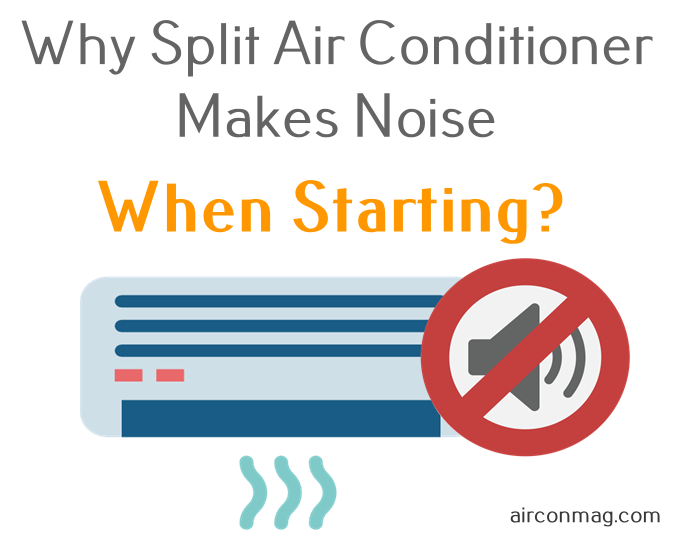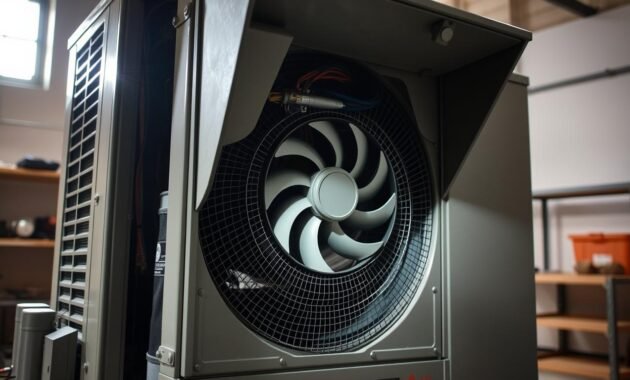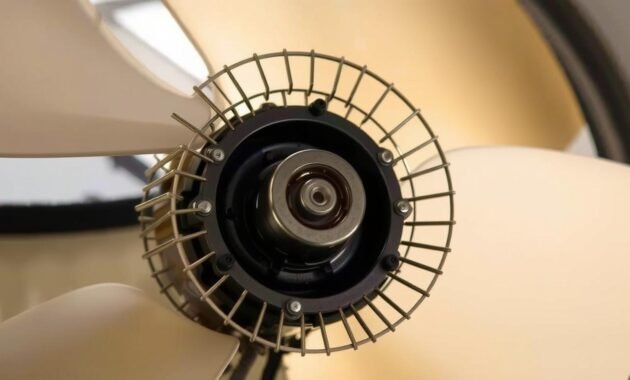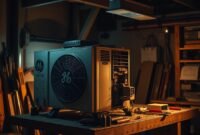Ever been startled by a thunderous roar when your air conditioner kicks on? You’re not alone. While some noise during startup is normal, a noisy air conditioner compressor can signal serious underlying issues that demand immediate attention.
I’ve seen countless homeowners ignore these warning sounds, only to face costly repairs later. An air conditioner that makes loud noise when starting might be crying out for help. From loose components to mechanical failures, these sounds are your system’s way of communicating problems.
Understanding these noises can save you thousands in repair costs and prevent unexpected breakdowns during the hottest days of summer. Let’s dive into what these sounds really mean and how you can protect your cooling investment.

Understanding Normal vs Abnormal AC Startup Sounds
Not all sounds when your HVAC system starts up mean trouble. Knowing the difference between normal noises and warning signs helps you fix issues before they get worse. This can save you from expensive repairs.
Common Operational Noises
Every air conditioning system makes some noise when it starts up. You might hear:
- Low humming when the compressor starts
- Gentle clicking as parts turn on
- Soft whooshing from air moving through ducts
Warning Signs of Problematic Sounds
Some startup sounds can mean there’s a mechanical problem. Watch out for these signs:
- Loud grinding or scraping noises
- High-pitched squealing
- Persistent banging or clanking
Decibel Levels to Watch For
Knowing about sound levels helps you spot problems. Here’s a quick guide to AC noise levels:
| Decibel Range | Sound Comparison | Potential Indication |
|---|---|---|
| 40-60 dB | Quiet conversation | Normal operation |
| 60-70 dB | Normal speaking voice | Mild concern |
| 70+ dB | Vacuum cleaner | Potential mechanical issue |
Spotting unusual sounds early can stop costly repairs and make your air conditioning last longer.
Read also: Quick Guide to Hisense Portable Air Conditioner Troubleshooting
Air Conditioner Makes Loud Noise When Starting: Main Causes

When your air conditioner starts up with a loud noise, it can be both alarming and frustrating. A loud ac unit startup often signals underlying issues that require immediate attention. I’ve identified several key reasons why your air conditioner might be making unexpected sounds during startup.
The most common causes of air conditioner rattling during startup include mechanical and electrical problems. These noises aren’t just annoying – they can indicate damage to your cooling system.
- Loose internal components causing vibration
- Debris trapped in the unit
- Compressor malfunction
- Fan motor wear and tear
- Electrical system irregularities
Understanding these issues can help you diagnose and address the problem before it gets worse. Each of these causes can contribute to the loud startup sounds you’re experiencing.
Read also: Why Does My Air Conditioner Turn Off by Itself?
| Noise Type | Potential Cause | Severity Level |
|---|---|---|
| Rattling | Loose Fan Blades | Moderate |
| Grinding | Compressor Issues | High |
| Buzzing | Electrical Problems | Critical |
I recommend paying close attention to these startup sounds. While some noises are normal, persistent loud sounds could indicate a more serious problem that might require professional inspection.
Loose Components and Debris Impact on AC Performance
When your air conditioning system starts making unusual noises, loose components and debris could be the culprits. These unexpected sounds can signal problems that might affect your AC’s efficiency and performance.
External debris poses big challenges for air conditioning units. Sticks, leaves, and small objects can get into the system, causing ac banging when turned on. These foreign materials create obstacles that disrupt normal operation.
External Debris Challenges
- Twigs and branches blocking air intake
- Accumulated leaves near condenser unit
- Small animals nesting inside external components
Internal Component Concerns
Inside your AC, loose components can cause serious problems. A loose fan blade might strike the unit’s cage, making loud grinding or banging sounds. Damaged internal mechanisms can quickly turn from minor annoyances to major repair needs.
Prevention and Maintenance Strategies
Protecting your air conditioning system requires proactive maintenance. Using a coil fins with a fin comb can help realign and clean delicate internal components. Regular inspections can spot problems before they become expensive repairs.
| Maintenance Action | Frequency | Benefit |
|---|---|---|
| External Unit Cleaning | Quarterly | Prevents debris accumulation |
| Fin Comb Alignment | Bi-Annually | Maintains optimal airflow |
| Professional Inspection | Annually | Comprehensive system check |
By understanding these issues and doing consistent maintenance, you can greatly reduce unexpected AC noises. This can also extend your system’s lifespan.
Compressor-Related Noise Issues During Startup
When your air conditioning system starts making unusual sounds, it might be a sign of trouble. A noisy air conditioner compressor can mean serious mechanical issues. These sounds often happen when the system starts up and can range from slight vibrations to loud rattling or clunking.
Compressor problems usually show up through specific sounds. Here are the most common noise indicators of compressor issues:
- Loud banging or knocking sounds during system startup
- Persistent metallic grinding noises
- Unexpected high-pitched squealing
- Aggressive vibrating sensations
The compressor is the heart of your air conditioning system. It circulates refrigerant and keeps things cool. When it starts to fail, it makes distinct sounds that shouldn’t be ignored. Older air conditioners are more likely to have compressor wear, which can be very expensive to fix.
Professional HVAC technicians say to fix noisy compressor symptoms fast. If you ignore these signs, your system could fail completely. This could cost a lot more to fix. Catching problems early can save you hundreds of dollars.
Fan Motor Problems and Grinding Sounds
When your air conditioner makes strange noises, it might be the fan motor. Grinding sounds when it starts or runs mean there’s a problem. Knowing these signs can stop bigger damage to your cooling system.

Bearing Wear and Tear
Fan motor bearings are key for smooth air conditioner work. They can wear out over time, causing noise. When they do, you’ll hear grinding or squealing sounds.
- Signs of bearing damage include persistent grinding noises
- Increased resistance when fan motor spins
- Visible rust or metal degradation
Lubrication Requirements
Proper lubrication is vital to fix loud air conditioner issues. Without enough, parts rub together, causing noise and wear. Regular checks can stop these problems.
| Lubrication Frequency | Recommended Action |
|---|---|
| Annual | Professional bearing lubrication |
| Bi-Annual | Inspect motor bearings for wear |
Motor Replacement Signs
Knowing when to replace your fan motor can save money. Look for loud noises, less airflow, and more energy use. These signs mean it’s time for a new motor.
- Loud, persistent mechanical noise
- Motor fails to start consistently
- Significant drop in cooling efficiency
- Age of unit exceeds 10-15 years
Electrical Issues Causing Startup Noises
When your central air conditioning system starts making unusual sounds during startup, electrical issues could be the culprit. As an experienced HVAC professional, I’ve seen numerous central air conditioning noise problems stemming from electrical components.
Electrical problems can manifest in several critical areas of your air conditioning system:
- Faulty capacitor causing intermittent clicking sounds
- Compressor electrical connection interruptions
- Thermostat wiring complications
- Damaged electrical control board
The capacitor plays a key role in your AC’s startup process. When it malfunctions, you might hear distinct clicking noises that signal electrical troubles. These sounds often indicate the capacitor struggles to provide the necessary electrical charge to start the compressor.
Compressor electrical issues can create significant startup noise. Damaged wiring or loose connections prevent smooth electrical transmission, resulting in grinding or buzzing sounds. Such problems require immediate attention from a qualified HVAC professional to prevent system failure.
Read also: Outside AC Unit Making Loud Noise, What May Cause It
Warning signs of electrical problems include:
- Repeated clicking sounds during startup
- Inconsistent system performance
- Sudden system shutdowns
- Burning electrical smell
Attempting to diagnose or repair electrical issues without professional expertise can be dangerous. Always consult a certified HVAC professional when experiencing persistent startup noises to ensure your safety and prevent system damage.
Impact of Poor Maintenance on AC Noise Levels
Your HVAC system loud startup can be a direct result of neglected maintenance. I’ve seen countless air conditioners develop unnecessary noise issues. This is because homeowners overlooked routine care. Regular maintenance is key to keeping your cooling system running smoothly and quietly.
Troubleshooting AC startup sounds starts with understanding the importance of consistent upkeep. Neglected air conditioners work harder, create more noise, and cost more to repair.
Regular Maintenance Schedule
I recommend a detailed maintenance routine to prevent unexpected noises and system breakdowns:
- Clean or replace air filters every 1-3 months
- Inspect electrical connections quarterly
- Lubricate moving parts annually
- Check refrigerant levels before summer season
- Clean outdoor unit and remove debris
Professional vs DIY Maintenance
While some maintenance tasks are DIY-friendly, professional service offers more thorough care. Here’s a quick comparison:
| DIY Tasks | Professional Services |
|---|---|
| Filter replacement | Full system diagnostic |
| External unit cleaning | Refrigerant level checking |
| Visual inspections | Complex electrical diagnostics |
Investing in regular maintenance can greatly reduce hvac system loud startup problems. It also extends your air conditioner’s lifespan. Don’t wait for expensive repairs – take proactive steps to keep your system running quietly and efficiently.
Simple Troubleshooting Steps Before Seeking Help
Dealing with a loud air conditioner? Try some simple steps first. These can help find and fix mechanical noise issues before you call a pro. Just a few minutes of inspection might save you money and time on repairs.
Begin by visually and audibly checking your air conditioner. Finding the source of the noise is often the first step to fixing it.
- Check for visible debris around the outdoor unit
- Ensure the air conditioner is level on its mounting surface
- Inspect external panels for loose screws or bolts
- Clean air filters and surrounding areas
- Listen carefully to pinpoint the exact location of air conditioner mechanical noise
Use a flashlight to look at hard-to-see spots. Look for signs of wear, like damaged fan blades or loose parts. Dirt buildup can also cause strange sounds when it starts up.
| Noise Type | Potential Cause | Quick Check |
|---|---|---|
| Grinding | Worn bearings | Check fan motor movement |
| Rattling | Loose components | Tighten external screws |
| Buzzing | Electrical issues | Inspect power connections |
If these steps don’t fix the noise, it’s time to call a pro. While basic checks can help, complex problems need a pro to avoid more damage to your AC.
Conclusion
Knowing what sounds your split air conditioning system makes can save you money and headaches. Not all startup noises mean trouble, but ignoring odd sounds can harm your HVAC system.
Regular maintenance keeps your air conditioning running well and quietly. An HVAC pro can spot issues early, saving you from big repair bills. I suggest getting your system checked every year to keep it efficient and quiet.
If strange sounds keep happening, call a qualified HVAC pro right away. Some noises can mean serious problems that need expert help. Being proactive and listening to your system can prevent big issues and make it last longer.
A well-kept air conditioning system is more than just comfort. It’s about protecting your investment and keeping your home cool and quiet. Pay attention to sounds, act fast, and trust the experts when you’re unsure.


